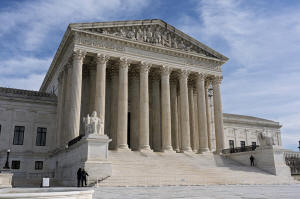Supreme Court takes up a Republican appeal to end limits on party
spending in federal elections
[July 01, 2025]
By MARK SHERMAN
WASHINGTON (AP) — The Supreme Court will take up a Republican-led drive,
backed by President Donald Trump's administration, to wipe away limits
on how much political parties can spend in coordination with candidates
for Congress and president.
The justices said Monday they will review an appellate ruling that
upheld a provision of federal election law that is more than 50 years
old, ignoring pleas from Democrats to leave the law in place. The
Supreme Court itself upheld it in 2001.
But since Chief Justice John Roberts joined the court in 2005, a
conservative majority has upended a variety of congressionally enacted
limits on raising and spending money to influence elections. The court's
2010 Citizens United decision opened the door to unlimited independent
spending in federal elections.
Without the limits on party spending, large donors would be able to
skirt caps on individual contributions to a candidate by directing
unlimited sums to the party with the understanding that the money will
be spent on behalf of the candidate, supporters of the law say.
The case will be argued in the fall.

Richard Hasen, an election law expert at the University of California at
Los Angeles law school, has predicted the court will strike down the
limits. “That may even make sense now in light of the prevalence of
super PAC spending that has undermined political parties and done
nothing to limit (and in fact increased) corruption and inequality,”
Hasen wrote on the Election Law blog.
The Justice Department almost always defends federal laws when they are
challenged in court. But the Trump administration notified the court
that “this is the rare case that warrants an exception to that general
approach” because it believes the law violates free-speech protections
in the First Amendment.
[to top of second column]
|

The Supreme Court is seen on Capitol Hill in Washington, Dec. 17,
2024. (AP Photo/J. Scott Applewhite, File)

The Republican committees for House and Senate candidates filed the
lawsuit in Ohio in 2022, joined by two Ohio Republicans in Congress,
then-Sen. J.D. Vance, who's now vice president, and then-Rep. Steve
Chabot.
In 2025, the coordinated party spending for Senate races ranges from
$127,200 in several states with small populations to nearly $4
million in California. For House races, the limits are $127,200 in
states with only one representative and $63,600 everywhere else.
The court also agreed to referee a fight between internet service
provider Cox Communications and record labels over illegal music
downloads by Cox customers.
The justices will review a lower-court ruling in a lawsuit led by
Sony Music Entertainment that Cox has to cut off customers who
downloaded music they didn’t pay for or face liability for any
future acts of digital piracy.
A jury had initially found Cox liable for more than $1 billion, but
the 4th U.S. Circuit Court of Appeals threw out the award. The high
court rejected the record labels’ appeal of that aspect of the
ruling.
All contents © copyright 2025 Associated Press. All rights reserved
 |